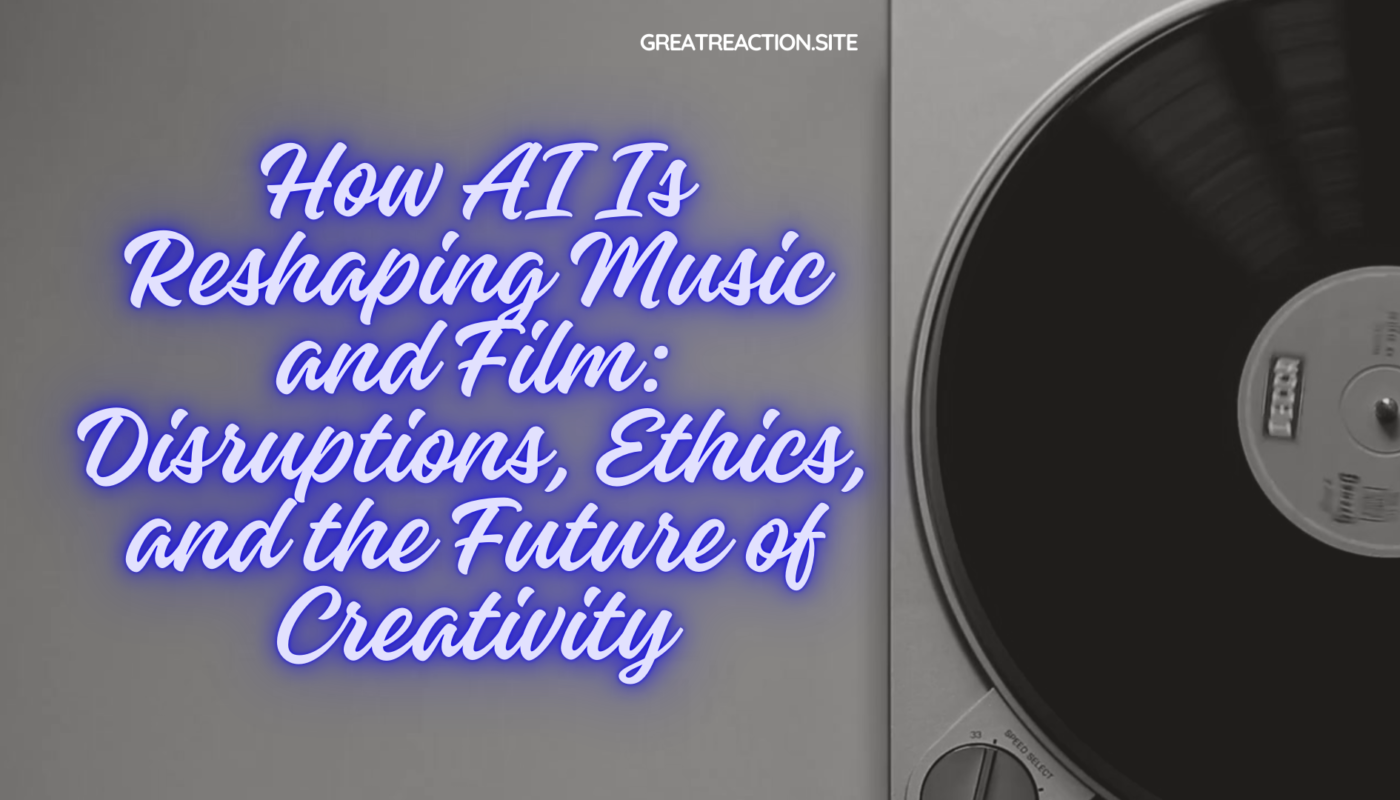The Rise of AI in Entertainment
From AI-powered Drake impersonations to fully synthetic films with actors who never existed, AI in music and film is no longer science fiction—it’s mainstream. The tools shaping our entertainment are evolving faster than laws or ethics can keep up.
In this deep dive, we’ll explore:
-
The five most disruptive ways AI is transforming music and cinema
-
Real-world examples of AI already fooling audiences
-
Why artists are protesting while quietly using AI behind the scenes
-
The ethical gray zones: deepfakes, copyright chaos, and mass layoffs
-
How to spot AI-generated content—and what the future might hold
1. AI in Music: The Five Biggest Disruptions
1. Vocal Cloning and Fake Collabs
The viral song “Heart on My Sleeve”, which mimicked Drake and The Weeknd, was entirely generated by AI using voice cloning tech like Microsoft’s VALL-E. It fooled millions—and alarmed the music industry. Universal Music demanded its removal, citing copyright violations.
Did You Know? AI can clone a voice using just a 3-second sample.
2. Algorithmic Hit-Making
Platforms like Boomy and Soundraw now generate royalty-free songs in seconds. On TikTok, AI-generated songs have racked up over 7 billion views.
-
14% of stock music is now AI-created
-
Labels are experimenting with AI for background scores and jingles
3. Ghostwritten Songs
Behind closed doors, major labels admit to using ChatGPT and other tools to write lyrics or even full song concepts. A leading K-pop agency revealed AI contributed to 30% of their recent output.
4. Personalized AI Music
Spotify’s new AI DJ adjusts playlists based on your listening habits—and even uses your voice data. While it sounds futuristic, it raises privacy concerns.
5. Session Musicians at Risk
AI tools like AIVA and Amper can compose orchestral music or beat-driven tracks, threatening real musicians.
Stat: 40% of studio musicians report fewer bookings due to AI alternatives.

2. AI in Film and TV: Disruption and Controversy
| AI Use Case | Real-World Example | Controversy |
|---|---|---|
| Digital Resurrection | Rogue One recreated actor Peter Cushing | Estates now license “AI likeness rights” |
| AI Scriptwriting | Marvel’s Secret Invasion used AI for its intro | Writers called it “lazy and plagiarized” |
| Background Extras | SAG-AFTRA protested AI scans of actors | Studios offered $200 for lifelong digital rights |
| Post-Production | AI editing at Disney saved millions | Over 500 editing jobs were cut |
| Fully AI-Generated Films | Next Gen Films produced a 100% synthetic movie | No human actors involved at all |
Director’s Take:
“AI can handle boring shots. But it can’t replace the human chaos that makes art magical.”
—Gareth Edwards, The Creator
3. The Ethical Minefield
Deepfakes and Deception
AI-generated deepfakes, like viral fake Tom Cruise videos, are becoming harder to spot. Even more disturbing: non-consensual deepfake porn is up 900% since 2021.
Copyright in the Age of AI
Is training AI on copyrighted songs and artwork theft or innovation? A major lawsuit—Getty Images vs. Stable Diffusion—may soon set a global precedent.
The Death of Artistic Identity
An illustrator recently discovered an AI model replicating her style perfectly. Clients are now offering her “AI-like” rates—a fraction of her usual fee.
4. How to Spot AI-Generated Content
Here are five ways to tell if what you’re watching or listening to is AI-made:
-
Music: Vocals are too perfect, with no breath or pitch variation
-
Film: Movements lack micro-expressions—faces seem eerily smooth
-
Lyrics: Overuse of clichés and metaphors like “love like wildfire”
-
Acting: Background extras have robotic gestures or emotionless faces
-
Art: AI still struggles with hands—look for misshapen fingers
Pro Tip: Do a reverse image search on suspicious “artists”—many are entirely AI-generated personas.
5. Is This the Future of Art or the End of It?
Optimistic View
-
AI democratizes creativity—anyone can make a song or short film
-
New careers are emerging: AI trainers, hybrid artists, ethics consultants
Pessimistic View
-
Cultural homogenization: songs and films feel “algorithmically perfect”
-
Human emotion, improvisation, and artistic flaws are disappearing
Middle Ground
“AI is just a tool. Garbage in, garbage out.” —Grimes, who publicly allows AI remixes of her voice
Final Thoughts: Should AI Art Be Labeled?
AI in music and film is here to stay. The question is not whether we can stop it—but how we’ll shape it. As audiences, creators, and policymakers, we must decide:
-
Should AI-generated content carry a warning label?
-
Is it ethical to train AI on living artists’ work?
-
Will human-made art become a luxury experience?
if you liked reading this article must checkout: Hidden Podcast Gems
also checkout: Click Here



